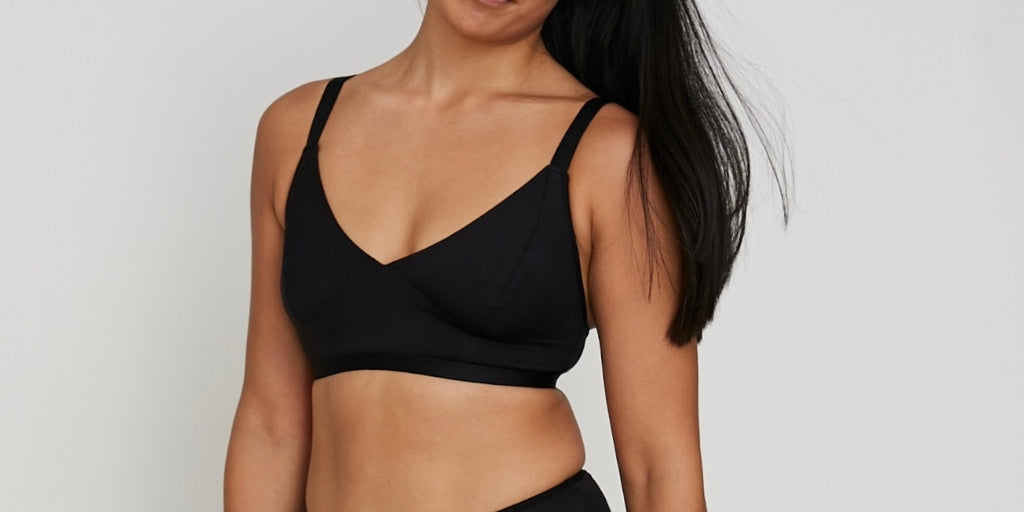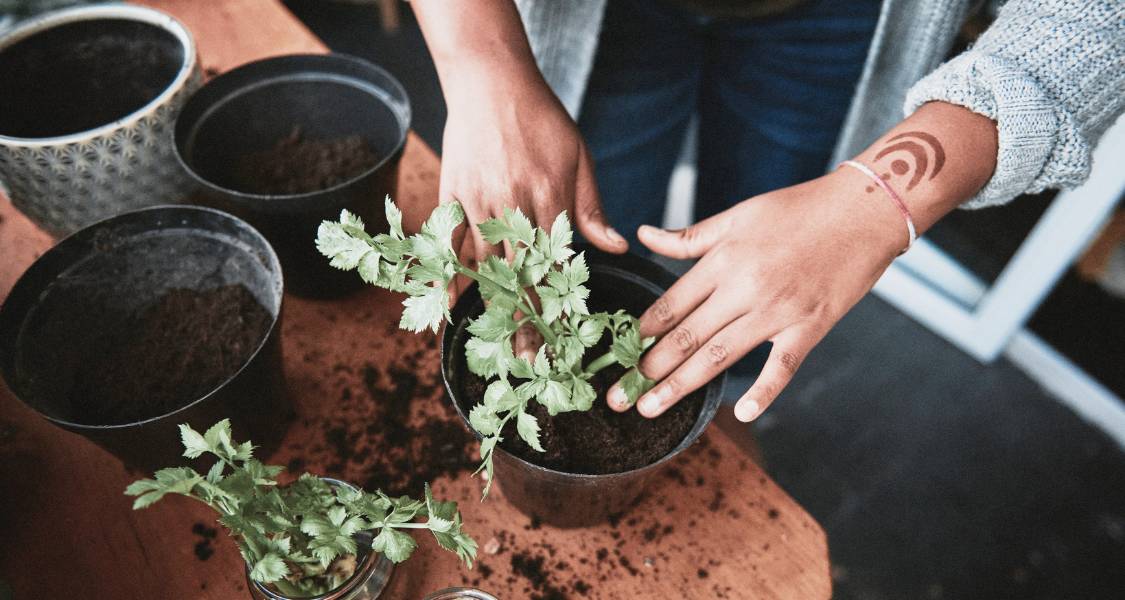Table of Contents
- What is Sustainable Living?
- Why Does Sustainable Living Matter?
- Our Top Tips To Live More Sustainably
- Start a sustainability journal
- How to make your closet more sustainable
- How to be more sustainable in the kitchen
- Eco-friendly bathroom ideas
- How to create an eco-friendly laundry room
- Other sustainable living ideas
- Additional Resources
Okay, so let’s allay any misconceptions first. To live more sustainably, you don’t have to go off grid, say goodbye to any form of modern convenience, or grow your own expansive vegetable garden.
From bamboo toothbrushes to reusable wash clothes and eco-friendly laundry detergent, there are so many easy ways we can make our homes more environmentally friendly. And healthier too.
And you don’t even need to spend a fortune replacing everything you own. Each time you go shopping, simply look for greener alternatives.
No matter how small or big, every change can help build a world with less pollution, less waste, fewer greenhouse gas emissions, and healthier oceans and forests.
In this guide, we break down exactly what sustainable living really means, why it’s so important, and provide suggestions on how to begin your sustainable journey, right now, in all areas of your life.
What is Sustainable Living?

At its core, sustainable living is about making healthier choices for our planet and for the people who live on it. It has become an umbrella term, encompassing everything from eco-friendly low-impact products to zero-waste shops to upcycling.
Sustainability cannot be defined by a set of rules. It is an ethos. A more thoughtful way of living that aims to preserve rather than deplete the Earth’s precious resources like water, energy, trees, and fossil fuels.
Put succinctly, it is choosing to respect our precious natural systems, as well as people, rather than abusing and exploiting them. It is choosing not to remain ignorant to the detrimental impacts that our own consumerism is having on the environment.
Of course, it would be easier to sit back and blame big corporations for the state of the Earth (and they are far from blameless). But, isn’t it time for all of us to step up and realise that as individuals, we play a major role in setting the standards for our future. By using our wallets as our voice, we can make a stand.
The greatest threat to our planet is the belief that someone else will save it – Robert Swan Obe
Why Does Sustainable Living Matter?
Our planet is in dire need of help. Adopting even just a few low-impact habits could set us on a better path to a cleaner, more sustainable future. In short: taking care of nature will also take care of you and future generations!
We all need crucial life support systems, like air, soil, land, and water, to maintain human life. Sustainable approaches aim to nurture the healthy, diverse, and resilient ecosystems that are vital for our survival.
Perhaps surprisingly, sustainability promotes social equality. Did you know climate change has a disproportionate impact on women and on those living in less privileged societies?
It is everyone’s responsibility to find solutions that will improve our current environmental and social circumstances for the better.
Our Top Tips To Live More Sustainably
How can you live a more sustainable life? There are many ways you can start living more sustainably straight away. First, adopt an eco-friendly mindset.
Then begin introducing more sustainable practices into your daily routine. It’s amazing how quickly little changes turn into habits.
For example, become more conscious of your personal waste. Are you constantly throwing away food because it’s out of date? How much water and energy are you consuming? Where can you invest in greener technologies and products? Here are some ideas.
Start a sustainability journal

The benefits of writing a journal are long recognised for things like mental health, travel, and in the academic environment. But, have you ever thought of starting a sustainability journal?
Once you have a clear understanding of where you are on your sustainable journey, you can use this as a benchmark and challenge yourself to improve. Why not set yourself a daily sustainability challenge?
Small changes can have a big impact. What can you change today to reduce your environmental footprint in the long term and contribute to making the planet a better place for future generations?
Well, your closet is a fantastic place to start your sustainability journey and eco-charge your lifestyle!
How to make your closet more sustainable

Managing your closet is one of the most effective ways you can reduce your environmental footprint. Every year, tonnes of clothing and textile waste is burned or thrown into landfill. Sadly, this is often because a lot of clothes were just not made to last.
In the words of the iconic British fashion designer and environmentalist:
Buy less, choose well and make it last – Vivienne Westwood
Shop second hand and support brands that are committed to doing the least amount of environmental damage. Shopping second-hand and avoiding fast fashion can be an exciting journey in itself.
A few things to think about before you buy. Do you know where the garment was made or what it is made from? What about who made it? Do you really need to buy that dress you’ll probably only wear once?
Learn to spot greenwashing and try to buy from truly eco-conscious brands.
Here are some tips on how to adapt a more minimalist wardrobe:
- Buy less and go for higher quality options
- Take care of your clothes
- Properly dispose of old tattered garments
- Shop with purpose and don't succumb to impulse buying
- Combine shopping trips to save on fuel and gas emissions
- Bring a friend on shopping trips to keep you accountable
How to be more sustainable in the kitchen

We're all guilty of over-shopping at the supermarket or splurging on takeaway instead of cooking the veggies in the bottom of our fridge. You know, the ones that are just on the brink – the head of cauliflower that probably won't make it another day or the carrots that are starting to look a little wrinkly.
If you do forsake those on-the-verge veggies in favour of takeaway pad Thai (no judgement here, we promise), try to order from places that use compostable packaging and source their ingredients locally.
On disciplined days, the kitchen is an easy place to start adopting more sustainable practices. Here are some other super easy ways to create a more sustainable kitchen:
- Reduce your food waste by planning your shopping trips
- Start composting
- Eat a more plant-based diet
- If you eat meat, choose organic and ethically-raised products
- Cook at home more often
- Prioritise local and seasonal food
- Shop organic products
- Grow your own food (even on your balcony!). If you don’t have the space, you could rent an allotment. Plenty of cities now have dedicated spaces for growing gardens. They are a great way to get out in nature and possibly meet some like minded people!

Eco-friendly bathroom ideas
When it comes to starting an eco-friendly lifestyle, your bathroom is an easy option. There are so many ways you can incorporate more eco-friendly practices into your daily pampering routine. Here are a few ideas to start with:
- Swap plastic shampoo bottles for shampoo bars
- Opt for reusable make-up pads and face cloths instead of disposable wipes
- Look for a bamboo toothbrush
- Switch to a menstrual cup
- Take shorter showers
- Look for makeup and facial products in reusable pots or cosmetic brands with take-back programmes
How to create an eco-friendly laundry room

Concerning your laundry room, saving the planet can mean savings for you too. Switching to an energy and water-saving washing machine is not only better for the environment but for your pockets too.
Since around 75–90% of the energy used by a washing machine is used to heat the water, you can save a huge amount by running only full loads with cold water.
Swap out the dryer for a drying rack or outdoor clothes line. This has the added benefit of keeping your clothes newer for longer, not to mention giving them a fresh outdoor aroma.
There are many environmentally friendly detergents or laundry strips that reduce the amount of pollution flowing out of the washing machine and into our waterways.
Microplastics are another important consideration. Did you know that synthetic fabrics shed harmful microfibres every time you wash them (and even while you're wearing them)?
These harmful synthetic fibres are then released into waterways and soil. You can help prevent the spread of microplastic pollution by choosing clothes made from natural materials or using a Guppyfriend or Cora Ball in your wash.
Other sustainable living ideas
There are a multitude of ways to bring more sustainable practices into your home. The key is to start small and adopt a minimalist mindset.
Begin by decluttering your house, only buying what you need, and always look for simple swaps. Try some of these habits that you can easily start today:
- Switch to energy saving light bulbs
- Make your own household cleaners and home products from environmentally friendly ingredients like vinegar and baking soda
- Swap paper towels for old t-shirts or reusable fabric cloths
- Always reuse what you can – e.g., glass bottles, plastic containers, etc.
- Make recycling a must!
Additional Resources
Remember, as an individual you can make a real difference by carefully researching products before you buy them and educating yourself about sustainable living.
As more and more people demand sustainable products, more companies will have to adopt environmentally friendly and ethical practices.
For even more tips on sustainable living, here is our go-to list of resources:
Living a more sustainable life doesn't have to be a chore. There are no set rules. Just get started now, and make it fun! It's all about embracing the beautiful things that give our life meaning by preparing ourselves, and our households, to shed old habits that are unsustainable.
By living by the three classic principles of environmental consciousness, the 3R’s - Reduce, Reuse, Recycle, we can get back to basics and honour nature.
Every choice all of us make impacts the people, animals, and environment around us. So let's use our time to make the smallest footprint: use less and replace that which we use.
Another plus, there are major health benefits to living more sustainably. With less dependence on machinery and vehicles, you can attain increased fitness and improve your life balance. Your health is instantly improved when consuming good quality, pesticide, and GMO-free foods.
Exercise and good food can increase happiness and reduce depression. Spending time in nature can have a similar effect. By using the sun’s energy, avoiding toxic materials, and using resources effectively, we can create a stable planet for future generations.
Lastly, living more sustainably can mean saving money. So, the extra effort you put in can benefit both your bank balance and our Earth. Another very good reason to commit!
The bottom line: Sustainable living will take a little effort at first, but with practice, it most certainly gets easier over time. And, it is definitely worth the effort.
For even more tips and inspiration on how to live more sustainably, join our mailing list. Plus, you’ll get 10% off your next order in our online shop!








